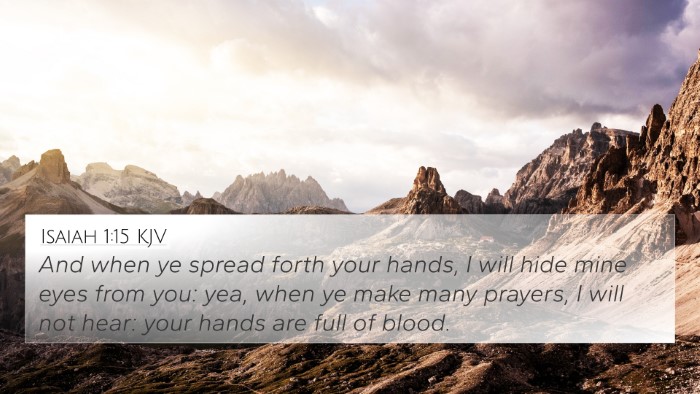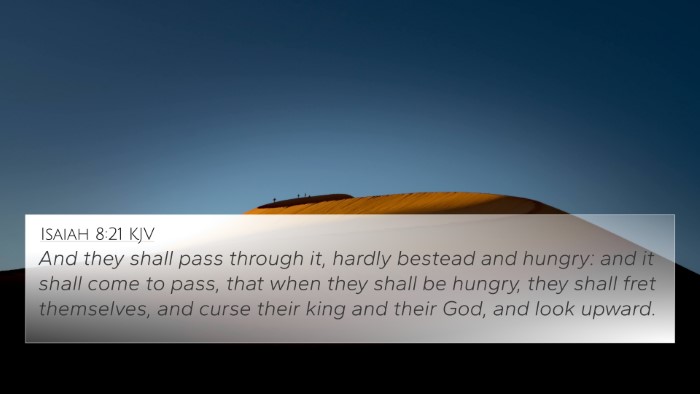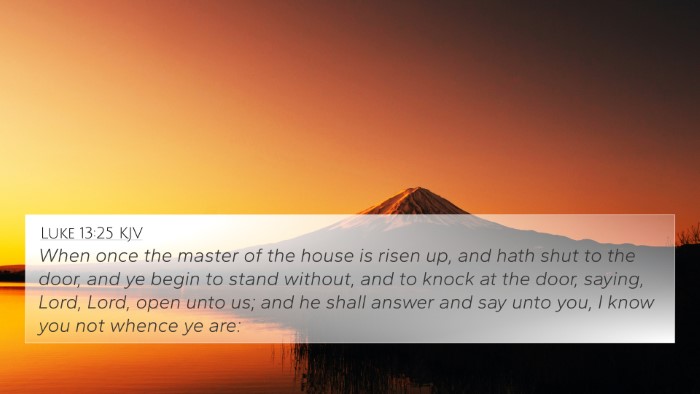Understanding 1 Samuel 8:18
Verse: "And ye shall cry out in that day because of your king which ye shall have chosen you; and the LORD will not hear you in that day." (1 Samuel 8:18)
Summary of Meaning
In this prophetic warning given by Samuel, the people of Israel are cautioned about the consequences of their choice to demand a king, forsaking God as their sole ruler. Samuel articulates that this decision will lead to regret, and ultimately, God will not answer their pleas when they cry out due to the burdens imposed by human leadership.
Commentary Insights
-
Matthew Henry:
Henry emphasizes the gravity of the Israelites' demand for a king, indicating that they were rejecting God's authority. This rebellion results in divine consequences, where God permits them to follow their desires while simultaneously forewarning them of future troubles.
-
Albert Barnes:
Barnes points out the prophetic nature of Samuel's warning, highlighting that the Israelites' cries during their time of distress will be met with silence from God. This reflects the principle that when individuals forsake divine guidance, they may face dire situations without hope of divine intervention.
-
Adam Clarke:
Clarke notes the implications of Israel's choice for a king, illustrating how this choice contradicts their covenant relationship with God. Clarke discusses the ensuing hardships and oppression that often accompany worldly governance as opposed to divine kingship.
Cross-References
1 Samuel 8:18 relates to several other Bible verses, contributing to a broader understanding of its context and implications:
- 1 Samuel 10:19 - The rejection of God as king.
- 1 Samuel 12:12-15 - Consequences of rejecting the LORD.
- Judges 8:23 - God as Israel's true leader.
- Matthew 23:37 - God’s lament over those who reject His guidance.
- Isaiah 30:1-3 - Woe to those who seek shelter in human power.
- Hosea 13:10-11 - The pitfalls of having a king.
- Jeremiah 2:13 - Forsaking the fountain of living waters.
Thematic Connections
This verse exemplifies key themes found throughout Scripture:
- Rejection of God: A recurring theme evident in Israel's history.
- Consequences of Choices: Benefits and burdens of leadership choices.
- Divine Silence: The human tendency to seek God only in moments of trouble.
- Human Authority vs. Divine Authority: The struggles between earthly rulers and divine governance.
Inter-Biblical Dialogue
This verse facilitates rich inter-Biblical dialogue, showing how themes of leadership and authority resonate across the testament:
- Connecting the struggle with Saul's leadership to instances across the Gospels where Jesus clarifies His kingship.
- Also relates to Paul's discussions on authority in Romans 13, emphasizing how God ordains rulers.
Practical Applications
Believers can draw practical lessons from 1 Samuel 8:18, including:
- The importance of seeking God's leadership in all areas of life.
- An awareness of the consequences of forsaking divine guidance for human solutions.
- Encouragement to cry out to God rather than relying solely on human institutions in crises.
Using Cross-References Effectively
Utilizing a Bible cross-reference guide can enhance understanding. Here are ways to effectively cross-reference:
- Identify key themes in your verse of interest.
- Use tools like a Bible concordance to find related verses.
- Engage in comparative Bible verse analysis by exploring how similar themes are addressed in various books.
- Take notes on the interconnections between Old and New Testament writings to deepen understanding.
Conclusion
1 Samuel 8:18 serves as a significant warning about the spiritual danger of eschewing divine governance for human authority. By closely examining this verse through the lens of context and cross-references, believers can gain profound insights into the nature of their relationship with God and the importance of His sovereignty throughout Scripture.










